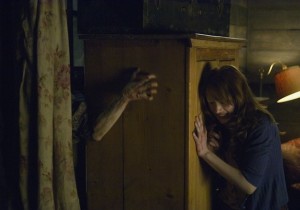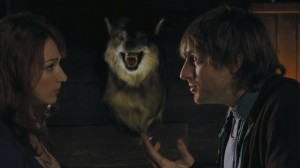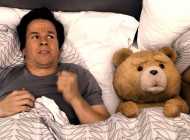Another visit to The Cabin in the Woods
 The talented Joss Whedon has a lesser-known hit this year, overshadowed by his colossal success with The Avengers. Whedon co-wrote The Cabin in the Woods
The talented Joss Whedon has a lesser-known hit this year, overshadowed by his colossal success with The Avengers. Whedon co-wrote The Cabin in the Woods, out today on DVD and Blu-ray, offering commentary on the formula of horror and our desire to watch it. Film critic Christopher Orr puts it best in his review, explaining “the movie is a delightful demolition of the horror genre, a tale that subverts not only its own terrors, but those of pretty much every scary movie you’ve ever seen. Why do protagonists of these films always choose the worst moment and locale to have sex? Why do they split up when it’s evident they should stick together? The Cabin in the Woods at last offers answers.”
In our 4-minute video review we looked at the narrative elements as “spoiler-free” as possible. Now that it’s out on DVD, we’ll tackle more nuance by discussing some of the “reveals” here.
 We’re introduced to five familiar character types who head up to a cabin to spend the weekend, and we expect some variation of crazed hicks, hockey masked zombie or a Necronomicon-spawned presence to torment and kill them. However, the film reveals there’s an underground group of technicians architecting the whole affair… from which creature is selected to even piping in drugs to the enhance stereotypical choices and blunders of the hapless college students. Watching the relatively indifferent people supervising the affair, the film indicts those in the seats and invites us to question why we watch: are we betting who dies first like those in the company betting pool? Are we appalled but still participating like others, fascinated, or only mildly diverted? What’s the point of it all anyway?
We’re introduced to five familiar character types who head up to a cabin to spend the weekend, and we expect some variation of crazed hicks, hockey masked zombie or a Necronomicon-spawned presence to torment and kill them. However, the film reveals there’s an underground group of technicians architecting the whole affair… from which creature is selected to even piping in drugs to the enhance stereotypical choices and blunders of the hapless college students. Watching the relatively indifferent people supervising the affair, the film indicts those in the seats and invites us to question why we watch: are we betting who dies first like those in the company betting pool? Are we appalled but still participating like others, fascinated, or only mildly diverted? What’s the point of it all anyway?
As the young adults are killed off, the last two (and we) slowly realize that the ritual is to appease beings called “Ancient Ones” living beneath the earth, kept in slumber by this annual ritual: a sacrifice of five young people who embody the whore, the athlete, the scholar, the fool, and the virgin. Each of are supposed to die in a specific order until only the virgin remains (her death is optional). This appeases the ancient ones, lest they awake and destroy the world.
 Effectively, the story gives us an old school narrative construct of angry deities and the need for human sacrifice, appeasing gods with blood atonement. The story conjurs images of Molech, or perhaps stories by H.P. Lovecraft, but it’s curious that the idea rests on the fact that we break down into one of a few character types that express various sins, and those sins must be sacramentally atoned for to keep the world safe.
Effectively, the story gives us an old school narrative construct of angry deities and the need for human sacrifice, appeasing gods with blood atonement. The story conjurs images of Molech, or perhaps stories by H.P. Lovecraft, but it’s curious that the idea rests on the fact that we break down into one of a few character types that express various sins, and those sins must be sacramentally atoned for to keep the world safe.
The story is clear that the stereotypes aren’t as clearly defined as we – or they – might like… since the overseers have to game the system and add chemicals to make one character less intelligent and even alter a plan of wisely “sticking together” with the classic Scooby Doo plan of foolishly “splitting up”. Despite their influence, however, the overseers are clear that the people need to make real choices, otherwise: “…the system doesn’t work. Like the harbinger… practically wears a sign saying “YOU WILL DIE”. Why would we put him there? The system. They have to CHOOSE to ignore him. They have to choose what happens in the cellar. Yeah, we write the game as much as we have to but in the end, if they don’t transgress they can’t be punished.”
The essence of the horror genre is deconstructed and distilled for the viewer:
-
People transgress.
-
Punishment is deserved.
-
Atonement is needed.
 For the horror buff, it’s a joy that in the final act, visions or variations on the scariest or classic monsters appear (werewolves, cenobites and of course – with a wink – unicorns) but in the story these all can be linked back to an ultimate, controlling source. In this case, the story literally portrays godlike beings for which this ritual atonement is required. Otherwise, the subsequent judgment of these beings is to destroy humanity and the world. Ask yourself: does this say something about our own deep fears about what underlies reality? Do you and I have transgressions? Do we know these deserve punishment? Is there an angry god to face wherein atonement will be needed? Is this the ultimate source of our fear?
For the horror buff, it’s a joy that in the final act, visions or variations on the scariest or classic monsters appear (werewolves, cenobites and of course – with a wink – unicorns) but in the story these all can be linked back to an ultimate, controlling source. In this case, the story literally portrays godlike beings for which this ritual atonement is required. Otherwise, the subsequent judgment of these beings is to destroy humanity and the world. Ask yourself: does this say something about our own deep fears about what underlies reality? Do you and I have transgressions? Do we know these deserve punishment? Is there an angry god to face wherein atonement will be needed? Is this the ultimate source of our fear?
The psalmist David cried out for the need of atonement for his transgressions against God: however, he also cried out for that atonement to be provided by God.
“Help us, O God of our salvation, for the glory of your name; deliver us, and atone for our sins, for your name’s sake!” – Psalm 79:9
The Cabin in the Woods toys with these grand, deep, ancient and even biblical ideas, but the message is understandably muddled. What do you conclude, or how do you conclude, a story of this magnitude in a horror/comedy? The ancient ones in this story evidence no forgiveness, no grace, only bloodthirsty desires and wrath. Atonement of some kind is desperately needed to appease them.
“Your deaths will avert countless others. You’ve seen horrible things: an army of nightmare creatures. And they are real. But they are nothing compared to what lies beneath us. There is a greater good, and for that you must be sacrificed. Forgive us… and let us end it quickly.”
 The girl Dana, the “virgin” is presented with the opportunity to save the world… and she turns it down. She and Marty slump down against the wall and effectively decide the world deserves to die. It’s easy to join them in “sticking it to the man” (or woman, or Sigourney Weaver to be precise, in a fantastic cameo appearance) but if you stop for a minute, think of the billions of women and children, ignorant people around the world and babies, they’ve just flippantly decided to obliterate, it begins to turn your stomach. Parents, think of your children. Think of your best friend, or a beloved sibling. Two cynical college kids decide to let humanity be eradicated by merciless, ancient titans and leave the planet a world of nightmares.
The girl Dana, the “virgin” is presented with the opportunity to save the world… and she turns it down. She and Marty slump down against the wall and effectively decide the world deserves to die. It’s easy to join them in “sticking it to the man” (or woman, or Sigourney Weaver to be precise, in a fantastic cameo appearance) but if you stop for a minute, think of the billions of women and children, ignorant people around the world and babies, they’ve just flippantly decided to obliterate, it begins to turn your stomach. Parents, think of your children. Think of your best friend, or a beloved sibling. Two cynical college kids decide to let humanity be eradicated by merciless, ancient titans and leave the planet a world of nightmares.
What would you have done, and why?
Dana could have given up her life to buy humanity another year, but she decides to throw in the towel on the whole human race. It’s surprising how counter-cultural this decision is, in a world where we say people are essentially good and everybody deserves a chance. In the classic 80s comedy Ghostbusters, our quirky paranormal investigators stave off the return of Gozer, an ancient deity summoned by Shandor, a cult leader who (Egon informs us) had decided “society was too sick to survive”. Here we see the protagonists in The Cabin in the Woods effectively decide that Shandor had the right idea and the Ghostbusters were wrong.
What’s most curious is that I don’t think either of them are wrong. The film suggests maybe humankind doesn’t deserve to go on, and Christianity would agree. Even Dana reveals she’s not a virgin, not truly pure, and one character inadvertently sums up humanity once again explaining that “we work with what we have.” Just as none of the other characters perfectly fit their transgressor archetype, Dana is misfit: she’s not without transgression.
“…as it is written: ‘None is righteous, no, not one'” – Romans 3:10
 If Shandor, Dana and Marty are right, and we’re all unfit to live, the ending of the movie is a truly fitting and likely future for humanity… as we’re extinguished by “ancient forces rising” or perhaps just natural selection and time. Thankfully, the true narrative I know plays out differently: it includes the reality of needed and righteous wrath… but satisfies the need for atonement as the psalmist David requested, restoring dignity and worth to mankind. We don’t deserve atonement, but it’s provided as grace. The gospel depicts a just and judging ancient God who holds transgressors to the fire, yet also provides the atonement needed to cover those transgressions, inviting humankind to receive that covering not for another year, but for eternity. Christianity is the odd worldview that can juggle both the viewpoint of the Ghostbusters and the decision of our Cabin-Dwellers and actually explain how both fit together. Thank God it provides the good news to offset the “you lose” ending of The Cabin in the Woods.
If Shandor, Dana and Marty are right, and we’re all unfit to live, the ending of the movie is a truly fitting and likely future for humanity… as we’re extinguished by “ancient forces rising” or perhaps just natural selection and time. Thankfully, the true narrative I know plays out differently: it includes the reality of needed and righteous wrath… but satisfies the need for atonement as the psalmist David requested, restoring dignity and worth to mankind. We don’t deserve atonement, but it’s provided as grace. The gospel depicts a just and judging ancient God who holds transgressors to the fire, yet also provides the atonement needed to cover those transgressions, inviting humankind to receive that covering not for another year, but for eternity. Christianity is the odd worldview that can juggle both the viewpoint of the Ghostbusters and the decision of our Cabin-Dwellers and actually explain how both fit together. Thank God it provides the good news to offset the “you lose” ending of The Cabin in the Woods.
Christ is the pure and perfect one who dies once for transgression so that all of us fools, athletes, whores and scholars can survive this temporal Cabin we live in, finding true escape from the horrors we face in this world.



